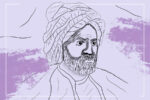By Ramyar Mahmood*
Translation by Daryas Salahhadin*
Kak Ahmed Sheikh is the son of Sheikh Marif Noude. Both father and son are famous in our religious, political, and cultural history. The father, Sheikh Marif Noude, was born in the village of Noude. He was home-educated by his family, then taught at the hands of the great scholars of Qalachwalan, the capital of Baban’s Emirate, which at that time was a prominent place of religious knowledge. He inherited his religious order from his mother’s father, Sheikh Ali Kosa of Dolpamo, who mentored him until he received his license permission. At that time, the school of the great mosque of Qalachwalan had a notable influence and Sheikh Marif Noude was a tutor in this school; the duties and responsibilities of the school were placed on Sheikh Marif’s shoulders at the end of the twelfth century of the Hijri calendar. Qalachwalan, the capital of Baban’s emirate, was relocated to the current great mosque of Sulaymaniyah and the famous library of Baban was also set up there.Buy now best rolex clone watches.
Sheikh Marif Noude started first as a tutor teaching at the school, and then became headteacher and librarian of the Baban library between 1785 and 1822. The school saw such great development during this time, that the number of his students increased to more than 70 students. This figure is according to Sheikh Marif Noude’s letter to the Governor of Baghdad, which he sent due to the Persian occupation of the Sulaymaniyah region. Here we will convey some sentences of the letter from Jamal Baban’s book:
“Ever since the King of Persia took over this country, state and religious affairs have been overwhelmingly disrupted, and the inhabitants of the villages have been displaced. The villages have all been razed, and the schools that were once full of of mullahs and faqehs (tutees) are now all empty and destroyed.Want a quality swiss replica watch? Welcome to fake watches! There were more than 70 students in our school who were at a high level of education, but now there are fewer than 10 students.”
The death of Sheikh Marif in 1837 and the collapse of the Baban Emirate in 1851 caused great damage to the library. Sheikh Marif was a great scholar and a person with high manners, who loved the poor and lived in poverty himself. He left 54 religious expositions after his death, most notably the book “Ahmedi”, a poetic dictionary in Kurdish and Arabic, written so that his son Kak Ahmed and his son’s friends could easily learn Kurdish and Arabic. Although Kak Ahmed Sheikh was able to reorganize the school for a while, and took over the responsibility for the library, after his death in 1888 vandalism and destruction visited the place again. The dirty hands of raiders claimed the library, and on the other hand, Kak Ahmad Sheikh’s children divided the library among themselves to protect its contents from theft and assault. In the times of Malik Mahmoud, those who went with the Sheikh found their homes pillaged, and their books and belongings were collected and burned in front of the great mosque of Sulaymaniah. The books that remained in the great mosque were thrown into a chamber until God sent Sheikh Muhammad Khal to save them.The Rolex Datejust replica is a classic replica watch. In the Rolex replica, replica datejust is a very well-known replica watches.
When Kak Ahmad Sheikh was born, Sheikh Marif Noude was in his 60s and his wife was in her 50s. They say that Kak Ahmed’s mother told Sheikh Marif Noude: “You write prayers for other women so God gives them a child, so write a prayer for us too, that God may give us a child as well.” Hajji Kak Ahmad Sheikh studied the Qur’an and other related books under his father’s guidance at their school, and then he studied Arabic language and linguistics, until he attained a good level of knowledge. He learned about the Tariqqat (religious order) and its religious disciplines and laws until he reached a proper level of knowledge to teach and mentor, which is when he received his mentorship license from his father, then started serving, mentoring, and teaching the ways of the order. Kak Ahmed went to Hajj and stayed in Medina for four years, where he served the Muslims in both Mecca and Medina mosques and established a proper guesthouse in Mecca for those who didn’t have enough financial means to last them for the duration of the hajj. He then came back to his homeland of Kurdistan and lived in Sulaimaniyah until he passed away, and was buried in the great mosque.
Shekhan family:
The Shekhan family are a strong religious, social, and political component of the Kurdish community, and their ancestry goes back to Sheikh Issa of Barzinja, son of Said Baba Ali Hamadani. According to Sheikh Latif Hafid’s memoirs, Sheikh Issa and Sheikh Musa settled in Barzinja in 1359. Sheikh Musa had no children but Sheikh Issa had twelve sons, and all of the Sheikhs of Kurdistan are descendants of Sheikh Issa, which is why they are called Saddat (Masters) of Barzinja as they all emerged from Barzinja. Some of them are called Sheikhs, while others are called Said. The great prominence and reputation of the Shekhan family comes from Sheikh Marif Noude and Hajji Kak Ahmed Sheikh. Sheikh Marif was a scientific and religious human encyclopedia of the Baban emirate, a significant religious source, and after him Hajji Kak Ahmed (1792-1887), took his place and gained great fame and popularity in Kurdistan and abroad. Sheikh Marif was a well-known Murshid (Guide) of the Qadiri Tariqqat (Order) in Sulaymaniyah. With Mawlana Khalid Murshidi of the Naqshbandi order, he was impacted by the political circumstances of the era. Sheikh Marif’s real name is Muhammad, which caused authors like Amin Zaki Bagg to be suspicious, saying, “I never understood the reason behind him changing his name”. Nawshirwan Mustafa pointed out that sheikhism in the foundations of Tariqqat had become an inheritance institution within one family, specifically from father to son. However, after the fall of the Baban Emirate, the foundations of Tariqqat became a key pillar of the Ottoman empire in Kurdistan, and Sultan Adbul Hamid, who considered himself the leader of the Islamic world, wanted to control the society through the use of religion. The Sultan helped them financially, with salaries, hajj fees, giving villages, and various other subsidies. According to Nawshirwan Mustafa, the Sheikhs of Sulaimaniyah, led by Kak Ahmed Sheikh, were the main source of resistance for stopping the Ottoman rule in most parts of the former Baban Emirate.
Of course, in my view, the difference between father and son here is that Sheikh Marif served within the time period of the Kurdish authorities, but by the time of Kak Ahmed Sheikh Ottoman rule had come in. In particular, there were hefty taxes on the residents of Sulaimaniyah residents during the time of Sheikh Saeed, until Sulaimaniyah merchants’ business owners resorted to Hamawand, who then came to Sulaimaniyah and took the city in 1881, asserting dominance over the Sheikhs of Barzinja.
In Sulaimaniyah around the era of the Baban Emirate, sociologically, the society consisted of three social types: a political class who were the Meers (Emirs) of Baban, then replaced by the officials who were selected by the Ottomans; a religious class that was formed from the Shekhans and Tariqqat families, who rose to prominence and power after the fall of the Babans; and the Kurdish bourgeoisie class of businessmen, craftsmen, and merchants.
Kak Ahmad Sheikh’s character:
Kak Ahmed was a very respected religious scholar and mentor among people and became more famous than his father. Despite his position in the Muslim community, he was also loved by Christians and Jews alike: if they had a problem or suffered in any way they would come to him. Sheikh Latif Hafid wrote in his memoirs that once there was a struggle between a Muslim of the city of Sablakh and a Jew, and that when Kak Ahmed Sheikh knew about this conflict, even though he was advanced in years, he set on his way to Sablakh on foot. When he arrived in Sablakh and became a guest in the Jewish man’s house, the people heard of this and so they went to the Jewish man’s home, along with the Muslim man who was involved in the dispute with the Jew. They asked him why he had not come to one of their houses, and in response he said that assault and harassment against anyone is not allowed in Islam, and that they should protect the weak and those with other beliefs.
The popularity he had even caused Sultan Abdulhamid II to request an audience with him in Istanbul. According to Sheikh Latifi Hafid’s memoirs, he responded to the Sultan that a poor lower-class person didn’t have any need to meet a Sultan. Jamal Baban indicated that he was unable to go to Istanbul, and Amin Zaki Bagg said he was not able to go and sent Said Muhammad Mufti instead. In the Russo-Turkish war (1875-1876), he gathered a well rounded force of the dervishes and sent them to the front under the flag of his grandson Sheikh Saeed.
Another quality of Hajji Kak Ahmad Sheikh, alongside his knowledge and wisdom, was how
open-minded he was. In meetings and gatherings, people freely expressed their opinions. They say that Khwaja Hanina, who was one of the well-known Jews of that time in Sulaimaniyah, often went to Kak Ahmad Sheikh and participated in the meetings. Once Kak Ahmed said to Khwaja Hanina, ”You are a very good man, why don’t you convert to Islam?” He replied with: ”My good sir, if Islam is what you are doing, it would be a very difficult burden for me to practice, and if it is what I’m seeing from some other Muslims, I think I prefer to stay a Jew”.
Another one of Hajji Ahmad Sheikh’s characteristics was his love for the Kurdish language. He always tried to teach his students in Kurdish and he cared a lot about the Kurdish language. The poet Hajji Qadir condemned a Koyi man in a poem for criticizing Kak Ahmad Sheikh because he taught in Kurdish:
“There is no one left except Kak Ahmed
The Sheikh of knowledge and the world of guidance
It is good, what he’s doing for the Kurds
The translation of the Shari’a, the verses of the Qur’an
He really means it to only serve God
What if it had not been in Kurdish?”
Hajji Qadir Koyi prays for the man and says:
“As soon as he said it, I was bedeviled with fury
I thought that I was losing my religion!
I said: you’re still on a mule,
So, I didn’t throw my fist out to punch his eyes”
_______________________________________
Note: I have benefited from these sources in writing this portrait:
1- The family of scholars, Author: Mullah Abdul Karim, prepared by Muhammad Ali Qaradaghi and supervised the printing. First issue, Shafiq Baghdad Printing House 1984
2- The history of Sulaymaniyah and the country, Author: Muhammad Amin Zaki Bag, prepared by Rafiq Salih, third edition, Zhin Center 2006
3- The memoirs of Sheikh Latif of Hafid, written by Sheikh Mahmoud Sheikh Kawa Hafid, first edition of 1995.
4- Planting flowers along the path, Nawshirwan Mustafa Amin, the first book of the third edition, the first edition of 2019 zhin printing house
5- My bright city Sulaimaniyah, Jamal Baban, first and second editions, Aras Printing House 2012
6- Sheikh Mahmud Qaraman and the country of southern Kurdistan, Author: M.R Hawar, the first edition London 1990
7- Baban in history and the great men of Baban, Jamal Baban, first edition 2018 Endeshe printing house
Charting: Azar Osman
_______________________________________
* Ramyar Mahmood is editor-in-chief at Kurdrawm, and he is also writer and poet.
*Daryas Salahaddin is a translator at Kurdrawm English.

